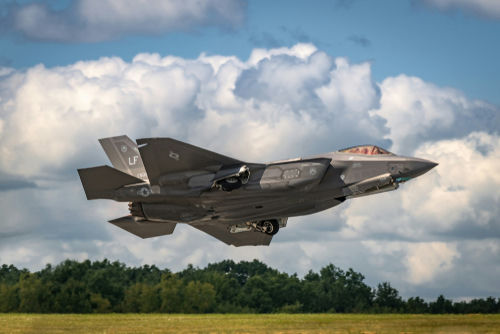The deployment of 10 F-35 fighter jets to Puerto Rico marks a significant escalation in the U.S.’s fight against drug cartels, raising both strategic opportunities and regional tensions.
Deployment of F-35s: A Strategic Shift
The United States is preparing to deploy 10 F-35 fighter jets to an unspecified airport in Puerto Rico. This move supports expanded anti-drug operations in the southern Caribbean, targeting drug cartels identified as “narco-terrorist organizations.” President Trump’s administration has been adamant about intensifying efforts to combat narcotics smuggling, and this deployment represents a significant escalation in U.S. military involvement.
With the jets expected to arrive by mid-September 2025, this is the first time advanced F-35s are being used for anti-drug operations in the region. The deployment comes amid heightened tensions with Venezuela, following recent military actions where U.S. forces struck a vessel allegedly carrying drugs from Venezuela, resulting in 11 deaths. Such operations underscore the administration’s commitment to tackling drug trafficking with military precision.
Historical Context and Recent Developments
The U.S. has a storied history of military operations in the Caribbean to curb drug trafficking, with Puerto Rico serving as a strategic base due to its proximity to major smuggling routes. Recent confrontations with Venezuelan forces have further heightened the stakes, as evidenced by Venezuelan F-16 jets buzzing a U.S. Navy destroyer in the Caribbean on September 4, 2025. These tensions are exacerbated by President Trump’s classification of certain cartels as terrorist organizations, signaling a more aggressive U.S. stance.
Despite the Pentagon’s silence, the deployment, reportedly set by anonymous sources, reflects a broader strategy of leveraging military assets to disrupt drug routes. This decision aligns with Trump’s political agenda, focusing on crime and border security, especially as the nation approaches an election season.
Potential Impacts and Regional Reactions
This unprecedented use of F-35s for drug interdiction could set a new precedent for military involvement in law enforcement roles. While it demonstrates the operational flexibility of these advanced jets, concerns about regional militarization and diplomatic fallout remain. The increased U.S. military presence in Puerto Rico may disrupt legitimate trade and tourism, impacting local economies and heightening anxiety among residents.
Furthermore, the potential for military confrontation with Venezuela poses risks of regional instability. These developments highlight the complex dynamics at play, where the U.S.’s overwhelming military capability must be balanced against the intricate political landscape of Latin America. The effectiveness of such a militarized approach to drug trafficking remains to be seen, with experts cautioning against potential mission creep and unintended consequences.

